2024年中考英语复习词法专题复习 连词课件(共25张PPT)
文档属性
| 名称 | 2024年中考英语复习词法专题复习 连词课件(共25张PPT) |

|
|
| 格式 | pptx | ||
| 文件大小 | 1.1MB | ||
| 资源类型 | 教案 | ||
| 版本资源 | 通用版 | ||
| 科目 | 英语 | ||
| 更新时间 | 2024-05-24 08:11:56 | ||
图片预览

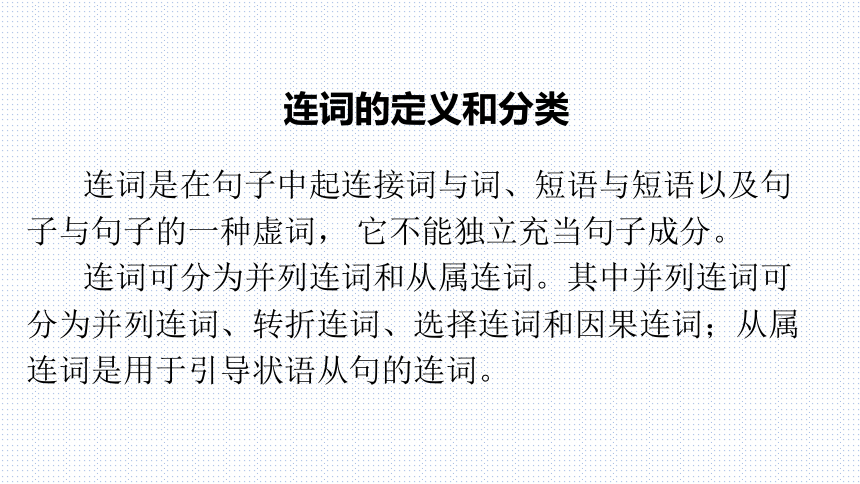
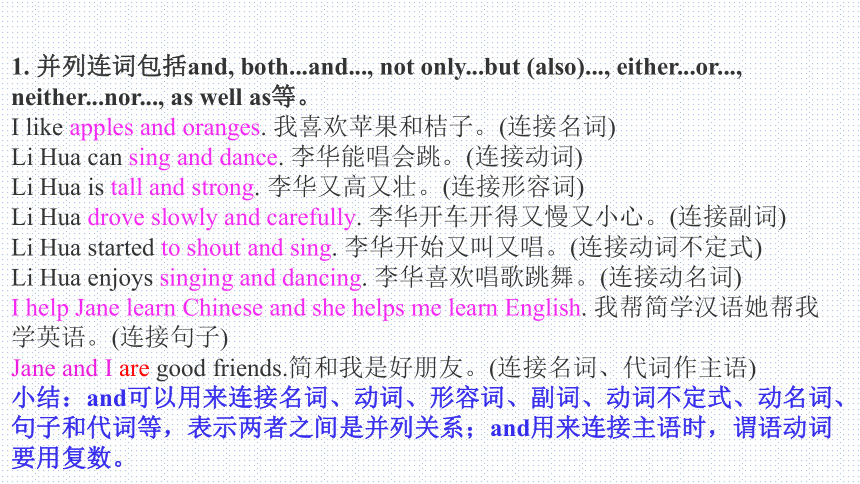
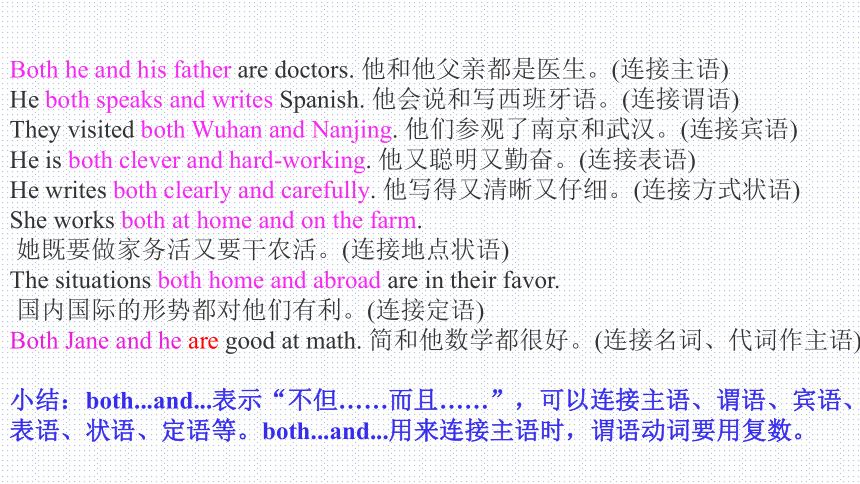
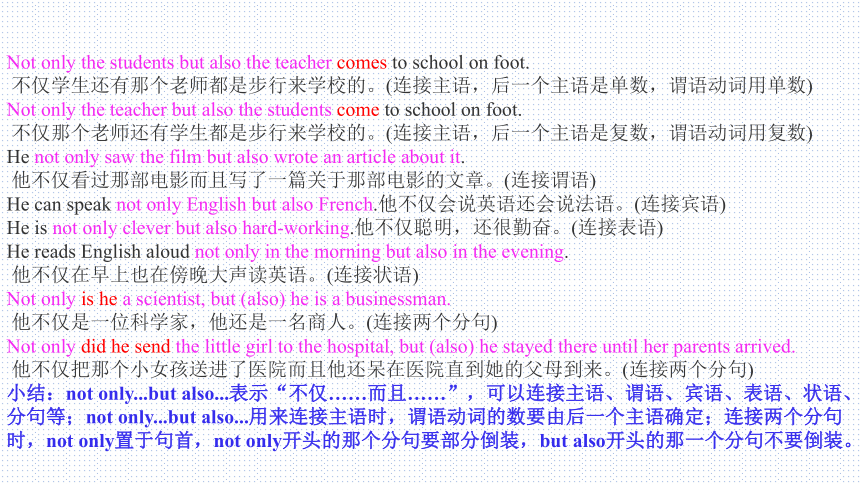
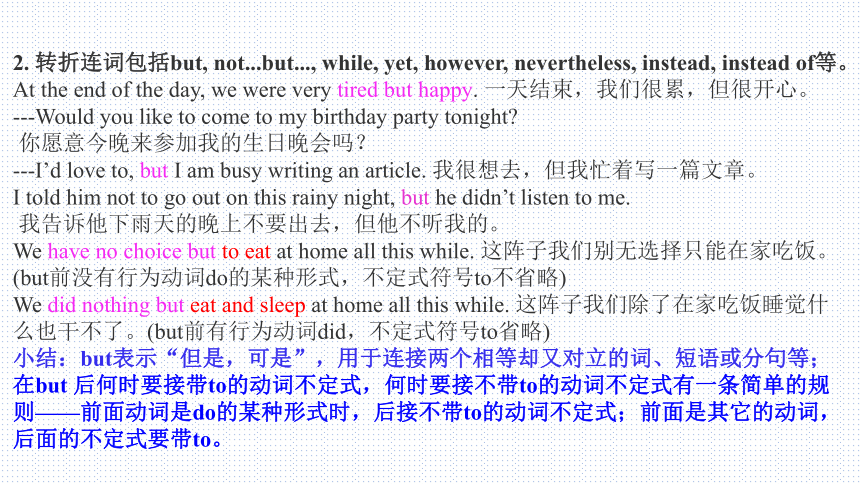
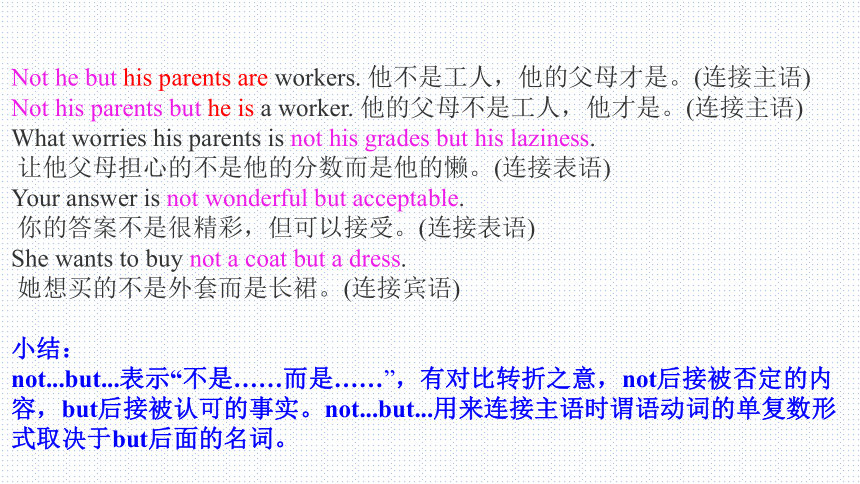

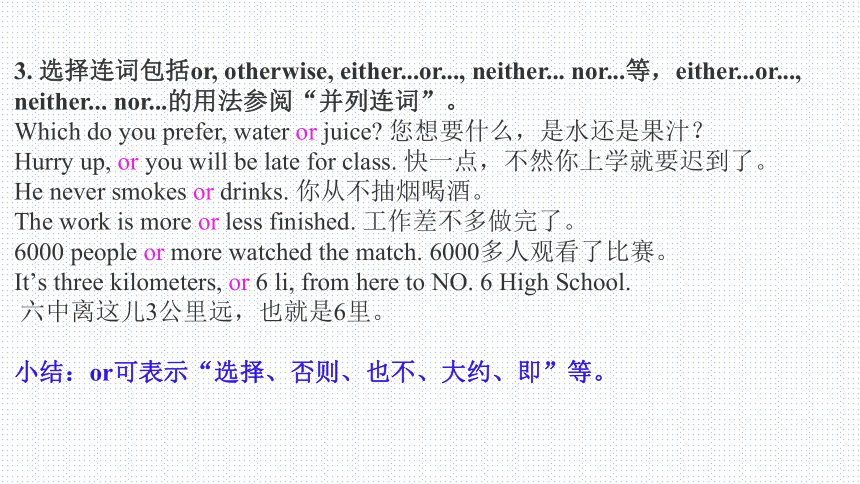
文档简介
(共25张PPT)
2024年中考英语复习词法专题★★
连词
连词的定义和分类
连词是在句子中起连接词与词、短语与短语以及句子与句子的一种虚词, 它不能独立充当句子成分。
连词可分为并列连词和从属连词。其中并列连词可分为并列连词、转折连词、选择连词和因果连词;从属连词是用于引导状语从句的连词。
1. 并列连词包括and, both...and..., not only...but (also)..., either...or..., neither...nor..., as well as等。
I like apples and oranges. 我喜欢苹果和桔子。(连接名词)
Li Hua can sing and dance. 李华能唱会跳。(连接动词)
Li Hua is tall and strong. 李华又高又壮。(连接形容词)
Li Hua drove slowly and carefully. 李华开车开得又慢又小心。(连接副词)
Li Hua started to shout and sing. 李华开始又叫又唱。(连接动词不定式)
Li Hua enjoys singing and dancing. 李华喜欢唱歌跳舞。(连接动名词)
I help Jane learn Chinese and she helps me learn English. 我帮简学汉语她帮我学英语。(连接句子)
Jane and I are good friends.简和我是好朋友。(连接名词、代词作主语)
小结:and可以用来连接名词、动词、形容词、副词、动词不定式、动名词、句子和代词等,表示两者之间是并列关系;and用来连接主语时,谓语动词要用复数。
Both he and his father are doctors. 他和他父亲都是医生。(连接主语)
He both speaks and writes Spanish. 他会说和写西班牙语。(连接谓语)
They visited both Wuhan and Nanjing. 他们参观了南京和武汉。(连接宾语)
He is both clever and hard-working. 他又聪明又勤奋。(连接表语)
He writes both clearly and carefully. 他写得又清晰又仔细。(连接方式状语)
She works both at home and on the farm.
她既要做家务活又要干农活。(连接地点状语)
The situations both home and abroad are in their favor.
国内国际的形势都对他们有利。(连接定语)
Both Jane and he are good at math. 简和他数学都很好。(连接名词、代词作主语)
小结:both...and...表示“不但……而且……”,可以连接主语、谓语、宾语、表语、状语、定语等。both...and...用来连接主语时,谓语动词要用复数。
Not only the students but also the teacher comes to school on foot.
不仅学生还有那个老师都是步行来学校的。(连接主语,后一个主语是单数,谓语动词用单数)
Not only the teacher but also the students come to school on foot.
不仅那个老师还有学生都是步行来学校的。(连接主语,后一个主语是复数,谓语动词用复数)
He not only saw the film but also wrote an article about it.
他不仅看过那部电影而且写了一篇关于那部电影的文章。(连接谓语)
He can speak not only English but also French.他不仅会说英语还会说法语。(连接宾语)
He is not only clever but also hard-working.他不仅聪明,还很勤奋。(连接表语)
He reads English aloud not only in the morning but also in the evening.
他不仅在早上也在傍晚大声读英语。(连接状语)
Not only is he a scientist, but (also) he is a businessman.
他不仅是一位科学家,他还是一名商人。(连接两个分句)
Not only did he send the little girl to the hospital, but (also) he stayed there until her parents arrived.
他不仅把那个小女孩送进了医院而且他还呆在医院直到她的父母到来。(连接两个分句)
小结:not only...but also...表示“不仅……而且……”,可以连接主语、谓语、宾语、表语、状语、分句等;not only...but also...用来连接主语时,谓语动词的数要由后一个主语确定;连接两个分句时,not only置于句首,not only开头的那个分句要部分倒装,but also开头的那一个分句不要倒装。
2. 转折连词包括but, not...but..., while, yet, however, nevertheless, instead, instead of等。
At the end of the day, we were very tired but happy. 一天结束,我们很累,但很开心。
---Would you like to come to my birthday party tonight
你愿意今晚来参加我的生日晚会吗?
---I’d love to, but I am busy writing an article. 我很想去,但我忙着写一篇文章。
I told him not to go out on this rainy night, but he didn’t listen to me.
我告诉他下雨天的晚上不要出去,但他不听我的。
We have no choice but to eat at home all this while. 这阵子我们别无选择只能在家吃饭。
(but前没有行为动词do的某种形式,不定式符号to不省略)
We did nothing but eat and sleep at home all this while. 这阵子我们除了在家吃饭睡觉什么也干不了。(but前有行为动词did,不定式符号to省略)
小结:but表示“但是,可是”,用于连接两个相等却又对立的词、短语或分句等;在but 后何时要接带to的动词不定式,何时要接不带to的动词不定式有一条简单的规则——前面动词是do的某种形式时,后接不带to的动词不定式;前面是其它的动词,后面的不定式要带to。
Not he but his parents are workers. 他不是工人,他的父母才是。(连接主语)
Not his parents but he is a worker. 他的父母不是工人,他才是。(连接主语)
What worries his parents is not his grades but his laziness.
让他父母担心的不是他的分数而是他的懒。(连接表语)
Your answer is not wonderful but acceptable.
你的答案不是很精彩,但可以接受。(连接表语)
She wants to buy not a coat but a dress.
她想买的不是外套而是长裙。(连接宾语)
小结:
not...but...表示“不是……而是……”,有对比转折之意,not后接被否定的内容,but后接被认可的事实。not...but...用来连接主语时谓语动词的单复数形式取决于but后面的名词。
I am not clever while my brother is quite smart.
我不聪明而我的弟弟却很机智。
Tom is strong while his wife Jill is thin.
汤姆很壮而他老婆吉尔很瘦。
Tom enjoys doing sports while his wife likes listening to music.
汤姆喜欢运动而他老婆爱听音乐。
小结:while表示“而,然而”,用来连接两个分句,侧重前后两者的对比。
3. 选择连词包括or, otherwise, either...or..., neither... nor...等,either...or..., neither... nor...的用法参阅“并列连词”。
Which do you prefer, water or juice 您想要什么,是水还是果汁?
Hurry up, or you will be late for class. 快一点,不然你上学就要迟到了。
He never smokes or drinks. 你从不抽烟喝酒。
The work is more or less finished. 工作差不多做完了。
6000 people or more watched the match. 6000多人观看了比赛。
It’s three kilometers, or 6 li, from here to NO. 6 High School.
六中离这儿3公里远,也就是6里。
小结:or可表示“选择、否则、也不、大约、即”等。
I have to go now, otherwise I’ll miss my train.
我不得不走了,否则我就要错过火车。
Thanks for your timely help; we wouldn’t have finished the task otherwise.
多谢您的及时帮助;要不然我们不可能按时完成任务。
There was water running outside the house. Otherwise it was silent.
屋外有水流的声音。除此之外,万籁俱寂。
小结:otherwise(高中词)表示“否则、要不然、除此之外”。
4. 因果连词包括so, as, for等。
I am in poor health condition, so I have to stay at home.
我的健康状况欠佳,所以我只能呆在家里。
Jane has a good memory, so she learns faster than others.
简的记忆力很好,所以她学得比别人快。
I will explain it more simply so you can understand it.
我会更简单地解释一下,以便你能够明白。
She got up early, so she could catch the first bus to the airport.
她早早起来,以便赶上早班车去机场。
小结:so表示“因此、所以、为了、以便”。
5. 从属连词用来引导状语从句。英语中共有9大类状语从句,所以从属连词也分为9大类。
(1) 引导时间状语从句的从属连词:as, while, when, whenever, before, after, until/till, since, as soon as等。
As they entered the hall, they found a box placed in the center.
当他们步入大厅,他们发现中间放着一个箱子。
While she was cooking, her son was playing with toys in the living room.
当她在煮饭的时候,她儿子在客厅玩玩具。
Will you please water the flowers while I am away
我不在的期间,请浇一下花好吗?
I was reading a book when the door bell rang.当门铃响时,我正在看书。
Whenever you need help, do call me.
任何时候你需要帮助,记得给我打电话。
Before he left the classroom, he turned off all the lights.
在他离开教室之前,他关掉了所有的灯。
He usually drinks a glass of warm water after he gets up.
早上起床后他通常喝一杯温水。
By law, everybody is a child until he is 18.
按照法律规定,十八岁之前都是未成年人。
They didn’t go to bed until all work had been finished.
他们直到所有工作做完才去睡觉。
Can’t you wait till we get home 你就不能等我们回到家吗?
It is twenty years since they knew each other. 他们已经彼此认识20年了。
He has taught in this school since he came to China.
自从他来中国之后他就在这所学校教书。
He rushed out of the house as soon as he got the news.
他一听到消息就冲出了房子。
(2) 引导地点状语从句的从属连词:where, wherever。
Stay where you are, I will come to pick you up.
呆在你所在的位置,我开车来接你。
Sit wherever you like, don’t move around.
你爱坐哪儿就坐哪儿,不要到处走动。
(3)引导原因状语从句的从属连词:because, since, as, for。
Jane didn’t come to school yesterday because she was ill.
简昨天没来上课是因为她生病了。
Since I put on weight easily, I do enough sports every day.
由于我非常容易长胖,我每天都做足够的运动。
As she is always careless, she seldom does well in exams.
由于她总是很粗心,她考试很少考得好。
As they were made by hand, each cake was a little different.
由于这些蛋糕是手工做的,每一个都有点差别。
It must have rained last night, for the ground is wet.
昨天晚上一定下雨了,因为地板是湿的。
Children are feeling happy, for the Spring Festival is around the corner.
孩子们很开心,因为春节就要来了。
(4)引导条件状语从句的从属连词: if, unless, once, as/so long as等。
It’s not easy for you to learn English well if you don’t read aloud
=It’s not easy for you to learn English well unless you read aloud.
如果你不大声读英语,你不太容易把英语学好。
If it doesn’t rain tomorrow, the football match won’t be put off.
如果明天不下雨,足球赛不会推迟。
=Unless it rains tomorrow, the football match won’t be put off.
除非明天下雨,足球赛不会推迟。
You will like her once you get to know her.
你一旦了解她,你就会喜欢她。
So/As long as you work harder, you will make progress.
只要你更努力,你会取得进步。
(5) 引导让步状语从句的从属连词:though, although, even if, even though, while, as(必须倒装), whether (or not)等。
Though I tried to solve the problem in different ways, I still failed to work it out.
虽然我试着用不同的方法解决这个问题,便我还是没能解出来。
Jane likes math, though she isn’t good at it at all.
虽然简数学不太好,但她仍然喜欢数学。
Poor though he is, he is kind to others. 虽然他很贫穷,他对别人很友善。
=Though he is poor, he is kind to others. 虽然他很贫穷,他对别人很友善。
Although she started learning English not very long ago, she has made great progress.
虽然她不久前才开始学英语,但她已经取得很大的进步。
Small child as he is, he knows a lot. 虽然他只是一个孩子,他懂得的东西很多。
Young as he is, he knows a lot. 虽然他只是一个孩子,他懂得的东西很多。
小结:当as表示“虽然,尽管”用来引导让步状语从句时,充当表语的形容词或名词必须倒装;though引导的让步状语从句可倒装可不倒装,although引导的让步状语从句不倒装。
Even if you did see someone, you can’t be sure it was him.
即使你确实看见有一个人,你也不能确定那就是他。
Even though he is quite poor, he tries his best to help people in need.
即使他相当穷,他仍然竭尽所能帮助有需要的人。
While I am willing to help, I don’t have much time. 虽然我愿意帮忙,我没有多少时间。
It remains to be seen whether or not this idea can be put into practice.
这一想法是否能够付诸实践还有待观察。
Whether you like it or not, you have to do some sports every day.
不管你喜欢不喜欢,你都必须每天做一些运动。
Whenever she comes, she brings a friend. 她每一次来都带着朋友。
=No matter when she comes, she brings a friend.
Some people can enjoy themselves wherever they are. 有些人不管在哪里都能够自得其乐。
=Some people can enjoy themselves no matter where they are.
However hard the situation was, he kept trying. 不管形势多么困难,他一直在努力。
=No matter how hard the situation was, he kept trying.
小结:whenever, wherever, however引导让步状语从句时,可以分别转化为no matter when, no matter where, no matter how引导的让步状语从句。
(6) 引导目的状语从句的从属连词:so that, in order that, for fear that, in case等。
Please leave your number so that Mr Li will call you later.
请留下您的电话号码以便李先生后面打电话给您。
They flew there in order that they would be in time for the meeting.
他们坐飞机去那儿以便及时开会。
I study English very hard in order that I can make more progress in it.
我努力学习英语,希望取得更大的进步。
He worked hard for fear that he might be fired by his boss.
他努力工作以防被老板解雇。
Leave a key with a neighbor in case you lock yourself out one day.
给邻居留把钥匙,以防哪一天你把自己锁在门外了。
小结:除in case引导的从句外,目的状语从句常用将来时态或含情态动词的谓语。
(7) 引导结果状语从句的从属连词:so...that, such...that, so that...
He woke up so early this morning that he felt tired the whole day.
=He woke up early this morning so that he felt tired the whole day.
他今天早上醒来太早了以致于一整天都感觉到累。
He was so weak that he couldn’t stand by himself.
=He was weak so that he couldn’t stand by himself.
他太虚弱了以致于站都站不住。
He was such a brave boy that he went into the forest alone.
=He was a brave boy so that he went into the forest alone.
他是那么勇敢的一个男孩,自己敢到森林里去。
There were so many students on the playground that I couldn’t find Jane.
操场上有那么多学生以致于我找不到简。
There is so little milk at home that you need to buy some today.
家里没什么牛奶了,你今天要买一点。
There was so much work to do that everyone had to stay until 11p.m..
要做的工作那么多,每个人都不得不干到晚上11点。
There were so few helping hands that we couldn’t finish the task on time.
帮忙的人手那么少,我们没能按时完成任务。
小结:由so+adj./adv.+that...和such+(a/an)+adj.+n.+that...引导的结果状语从句,可以转化成由so that引导的结果状语从句;在such+(a/an)+adj.+n.+that...句型中,当形容词为“多多少少”(many/much/little/few)时,such要用so来代替。
(8) 引导方式状语从句的从属连词: as, just as, as if, as though等。
They reacted as they were told. 他们按被告知的做出了反应。
Things turned out just as I had expected. 一切如我所料。
Plants need sunshine just as they need water.
植物需要阳光,就如它们需要水一样。
It seems as if/ as though it is going to rain.
天看起来要下雨了。(表语从句、陈述语气)
I felt as if/ as though my heart had stopped beating.
我感觉好像我的心都不跳了。(表语从句、虚拟语气)
She behaved as if/ as though she knew nothing about it.
她表现得好像对此一无所知。(方式状语从句、陈述语气)
She treats the dog as if/ as though it were her son.
她对待那只狗就像是对待她的儿子一样。(方式状语从句、虚拟语气)
小结:as if/ as though可以引导表语从句(位于连系动词之后),也可以引导方式状语从句(位于行为动词之后);从句可以用陈述语气(与事实一致),也可以用虚拟语气(与事实相反)。
(9) 引导比较状语从句的从属连词包括as...as, not so/as...as, more/less...than, the+比较级, the+比较级。
He is as hardworking as his brother is.
他和他的哥哥一样勤奋。
He didn’t dance as well as his sister did in the last performance.
上一次表演,他没有他姐姐跳得好。
They asked for more money than we could afford.
他们要的钱比我们能出得起的高。
They provided less help than we had expected.
他们提供的帮助比我们预期的少。
The harder you study, the better result you will get.
你越努力学习,你获得越好的结果。
6. 学习连词的重点:用于表示语篇行文的逻辑,尤其是阅读理解、七选五、完形填空中,逻辑转换处往往是命题的题眼;在书面表达中,连词的正确使用让行文更加流畅、合理。
See you !
2024年中考英语复习词法专题★★
连词
连词的定义和分类
连词是在句子中起连接词与词、短语与短语以及句子与句子的一种虚词, 它不能独立充当句子成分。
连词可分为并列连词和从属连词。其中并列连词可分为并列连词、转折连词、选择连词和因果连词;从属连词是用于引导状语从句的连词。
1. 并列连词包括and, both...and..., not only...but (also)..., either...or..., neither...nor..., as well as等。
I like apples and oranges. 我喜欢苹果和桔子。(连接名词)
Li Hua can sing and dance. 李华能唱会跳。(连接动词)
Li Hua is tall and strong. 李华又高又壮。(连接形容词)
Li Hua drove slowly and carefully. 李华开车开得又慢又小心。(连接副词)
Li Hua started to shout and sing. 李华开始又叫又唱。(连接动词不定式)
Li Hua enjoys singing and dancing. 李华喜欢唱歌跳舞。(连接动名词)
I help Jane learn Chinese and she helps me learn English. 我帮简学汉语她帮我学英语。(连接句子)
Jane and I are good friends.简和我是好朋友。(连接名词、代词作主语)
小结:and可以用来连接名词、动词、形容词、副词、动词不定式、动名词、句子和代词等,表示两者之间是并列关系;and用来连接主语时,谓语动词要用复数。
Both he and his father are doctors. 他和他父亲都是医生。(连接主语)
He both speaks and writes Spanish. 他会说和写西班牙语。(连接谓语)
They visited both Wuhan and Nanjing. 他们参观了南京和武汉。(连接宾语)
He is both clever and hard-working. 他又聪明又勤奋。(连接表语)
He writes both clearly and carefully. 他写得又清晰又仔细。(连接方式状语)
She works both at home and on the farm.
她既要做家务活又要干农活。(连接地点状语)
The situations both home and abroad are in their favor.
国内国际的形势都对他们有利。(连接定语)
Both Jane and he are good at math. 简和他数学都很好。(连接名词、代词作主语)
小结:both...and...表示“不但……而且……”,可以连接主语、谓语、宾语、表语、状语、定语等。both...and...用来连接主语时,谓语动词要用复数。
Not only the students but also the teacher comes to school on foot.
不仅学生还有那个老师都是步行来学校的。(连接主语,后一个主语是单数,谓语动词用单数)
Not only the teacher but also the students come to school on foot.
不仅那个老师还有学生都是步行来学校的。(连接主语,后一个主语是复数,谓语动词用复数)
He not only saw the film but also wrote an article about it.
他不仅看过那部电影而且写了一篇关于那部电影的文章。(连接谓语)
He can speak not only English but also French.他不仅会说英语还会说法语。(连接宾语)
He is not only clever but also hard-working.他不仅聪明,还很勤奋。(连接表语)
He reads English aloud not only in the morning but also in the evening.
他不仅在早上也在傍晚大声读英语。(连接状语)
Not only is he a scientist, but (also) he is a businessman.
他不仅是一位科学家,他还是一名商人。(连接两个分句)
Not only did he send the little girl to the hospital, but (also) he stayed there until her parents arrived.
他不仅把那个小女孩送进了医院而且他还呆在医院直到她的父母到来。(连接两个分句)
小结:not only...but also...表示“不仅……而且……”,可以连接主语、谓语、宾语、表语、状语、分句等;not only...but also...用来连接主语时,谓语动词的数要由后一个主语确定;连接两个分句时,not only置于句首,not only开头的那个分句要部分倒装,but also开头的那一个分句不要倒装。
2. 转折连词包括but, not...but..., while, yet, however, nevertheless, instead, instead of等。
At the end of the day, we were very tired but happy. 一天结束,我们很累,但很开心。
---Would you like to come to my birthday party tonight
你愿意今晚来参加我的生日晚会吗?
---I’d love to, but I am busy writing an article. 我很想去,但我忙着写一篇文章。
I told him not to go out on this rainy night, but he didn’t listen to me.
我告诉他下雨天的晚上不要出去,但他不听我的。
We have no choice but to eat at home all this while. 这阵子我们别无选择只能在家吃饭。
(but前没有行为动词do的某种形式,不定式符号to不省略)
We did nothing but eat and sleep at home all this while. 这阵子我们除了在家吃饭睡觉什么也干不了。(but前有行为动词did,不定式符号to省略)
小结:but表示“但是,可是”,用于连接两个相等却又对立的词、短语或分句等;在but 后何时要接带to的动词不定式,何时要接不带to的动词不定式有一条简单的规则——前面动词是do的某种形式时,后接不带to的动词不定式;前面是其它的动词,后面的不定式要带to。
Not he but his parents are workers. 他不是工人,他的父母才是。(连接主语)
Not his parents but he is a worker. 他的父母不是工人,他才是。(连接主语)
What worries his parents is not his grades but his laziness.
让他父母担心的不是他的分数而是他的懒。(连接表语)
Your answer is not wonderful but acceptable.
你的答案不是很精彩,但可以接受。(连接表语)
She wants to buy not a coat but a dress.
她想买的不是外套而是长裙。(连接宾语)
小结:
not...but...表示“不是……而是……”,有对比转折之意,not后接被否定的内容,but后接被认可的事实。not...but...用来连接主语时谓语动词的单复数形式取决于but后面的名词。
I am not clever while my brother is quite smart.
我不聪明而我的弟弟却很机智。
Tom is strong while his wife Jill is thin.
汤姆很壮而他老婆吉尔很瘦。
Tom enjoys doing sports while his wife likes listening to music.
汤姆喜欢运动而他老婆爱听音乐。
小结:while表示“而,然而”,用来连接两个分句,侧重前后两者的对比。
3. 选择连词包括or, otherwise, either...or..., neither... nor...等,either...or..., neither... nor...的用法参阅“并列连词”。
Which do you prefer, water or juice 您想要什么,是水还是果汁?
Hurry up, or you will be late for class. 快一点,不然你上学就要迟到了。
He never smokes or drinks. 你从不抽烟喝酒。
The work is more or less finished. 工作差不多做完了。
6000 people or more watched the match. 6000多人观看了比赛。
It’s three kilometers, or 6 li, from here to NO. 6 High School.
六中离这儿3公里远,也就是6里。
小结:or可表示“选择、否则、也不、大约、即”等。
I have to go now, otherwise I’ll miss my train.
我不得不走了,否则我就要错过火车。
Thanks for your timely help; we wouldn’t have finished the task otherwise.
多谢您的及时帮助;要不然我们不可能按时完成任务。
There was water running outside the house. Otherwise it was silent.
屋外有水流的声音。除此之外,万籁俱寂。
小结:otherwise(高中词)表示“否则、要不然、除此之外”。
4. 因果连词包括so, as, for等。
I am in poor health condition, so I have to stay at home.
我的健康状况欠佳,所以我只能呆在家里。
Jane has a good memory, so she learns faster than others.
简的记忆力很好,所以她学得比别人快。
I will explain it more simply so you can understand it.
我会更简单地解释一下,以便你能够明白。
She got up early, so she could catch the first bus to the airport.
她早早起来,以便赶上早班车去机场。
小结:so表示“因此、所以、为了、以便”。
5. 从属连词用来引导状语从句。英语中共有9大类状语从句,所以从属连词也分为9大类。
(1) 引导时间状语从句的从属连词:as, while, when, whenever, before, after, until/till, since, as soon as等。
As they entered the hall, they found a box placed in the center.
当他们步入大厅,他们发现中间放着一个箱子。
While she was cooking, her son was playing with toys in the living room.
当她在煮饭的时候,她儿子在客厅玩玩具。
Will you please water the flowers while I am away
我不在的期间,请浇一下花好吗?
I was reading a book when the door bell rang.当门铃响时,我正在看书。
Whenever you need help, do call me.
任何时候你需要帮助,记得给我打电话。
Before he left the classroom, he turned off all the lights.
在他离开教室之前,他关掉了所有的灯。
He usually drinks a glass of warm water after he gets up.
早上起床后他通常喝一杯温水。
By law, everybody is a child until he is 18.
按照法律规定,十八岁之前都是未成年人。
They didn’t go to bed until all work had been finished.
他们直到所有工作做完才去睡觉。
Can’t you wait till we get home 你就不能等我们回到家吗?
It is twenty years since they knew each other. 他们已经彼此认识20年了。
He has taught in this school since he came to China.
自从他来中国之后他就在这所学校教书。
He rushed out of the house as soon as he got the news.
他一听到消息就冲出了房子。
(2) 引导地点状语从句的从属连词:where, wherever。
Stay where you are, I will come to pick you up.
呆在你所在的位置,我开车来接你。
Sit wherever you like, don’t move around.
你爱坐哪儿就坐哪儿,不要到处走动。
(3)引导原因状语从句的从属连词:because, since, as, for。
Jane didn’t come to school yesterday because she was ill.
简昨天没来上课是因为她生病了。
Since I put on weight easily, I do enough sports every day.
由于我非常容易长胖,我每天都做足够的运动。
As she is always careless, she seldom does well in exams.
由于她总是很粗心,她考试很少考得好。
As they were made by hand, each cake was a little different.
由于这些蛋糕是手工做的,每一个都有点差别。
It must have rained last night, for the ground is wet.
昨天晚上一定下雨了,因为地板是湿的。
Children are feeling happy, for the Spring Festival is around the corner.
孩子们很开心,因为春节就要来了。
(4)引导条件状语从句的从属连词: if, unless, once, as/so long as等。
It’s not easy for you to learn English well if you don’t read aloud
=It’s not easy for you to learn English well unless you read aloud.
如果你不大声读英语,你不太容易把英语学好。
If it doesn’t rain tomorrow, the football match won’t be put off.
如果明天不下雨,足球赛不会推迟。
=Unless it rains tomorrow, the football match won’t be put off.
除非明天下雨,足球赛不会推迟。
You will like her once you get to know her.
你一旦了解她,你就会喜欢她。
So/As long as you work harder, you will make progress.
只要你更努力,你会取得进步。
(5) 引导让步状语从句的从属连词:though, although, even if, even though, while, as(必须倒装), whether (or not)等。
Though I tried to solve the problem in different ways, I still failed to work it out.
虽然我试着用不同的方法解决这个问题,便我还是没能解出来。
Jane likes math, though she isn’t good at it at all.
虽然简数学不太好,但她仍然喜欢数学。
Poor though he is, he is kind to others. 虽然他很贫穷,他对别人很友善。
=Though he is poor, he is kind to others. 虽然他很贫穷,他对别人很友善。
Although she started learning English not very long ago, she has made great progress.
虽然她不久前才开始学英语,但她已经取得很大的进步。
Small child as he is, he knows a lot. 虽然他只是一个孩子,他懂得的东西很多。
Young as he is, he knows a lot. 虽然他只是一个孩子,他懂得的东西很多。
小结:当as表示“虽然,尽管”用来引导让步状语从句时,充当表语的形容词或名词必须倒装;though引导的让步状语从句可倒装可不倒装,although引导的让步状语从句不倒装。
Even if you did see someone, you can’t be sure it was him.
即使你确实看见有一个人,你也不能确定那就是他。
Even though he is quite poor, he tries his best to help people in need.
即使他相当穷,他仍然竭尽所能帮助有需要的人。
While I am willing to help, I don’t have much time. 虽然我愿意帮忙,我没有多少时间。
It remains to be seen whether or not this idea can be put into practice.
这一想法是否能够付诸实践还有待观察。
Whether you like it or not, you have to do some sports every day.
不管你喜欢不喜欢,你都必须每天做一些运动。
Whenever she comes, she brings a friend. 她每一次来都带着朋友。
=No matter when she comes, she brings a friend.
Some people can enjoy themselves wherever they are. 有些人不管在哪里都能够自得其乐。
=Some people can enjoy themselves no matter where they are.
However hard the situation was, he kept trying. 不管形势多么困难,他一直在努力。
=No matter how hard the situation was, he kept trying.
小结:whenever, wherever, however引导让步状语从句时,可以分别转化为no matter when, no matter where, no matter how引导的让步状语从句。
(6) 引导目的状语从句的从属连词:so that, in order that, for fear that, in case等。
Please leave your number so that Mr Li will call you later.
请留下您的电话号码以便李先生后面打电话给您。
They flew there in order that they would be in time for the meeting.
他们坐飞机去那儿以便及时开会。
I study English very hard in order that I can make more progress in it.
我努力学习英语,希望取得更大的进步。
He worked hard for fear that he might be fired by his boss.
他努力工作以防被老板解雇。
Leave a key with a neighbor in case you lock yourself out one day.
给邻居留把钥匙,以防哪一天你把自己锁在门外了。
小结:除in case引导的从句外,目的状语从句常用将来时态或含情态动词的谓语。
(7) 引导结果状语从句的从属连词:so...that, such...that, so that...
He woke up so early this morning that he felt tired the whole day.
=He woke up early this morning so that he felt tired the whole day.
他今天早上醒来太早了以致于一整天都感觉到累。
He was so weak that he couldn’t stand by himself.
=He was weak so that he couldn’t stand by himself.
他太虚弱了以致于站都站不住。
He was such a brave boy that he went into the forest alone.
=He was a brave boy so that he went into the forest alone.
他是那么勇敢的一个男孩,自己敢到森林里去。
There were so many students on the playground that I couldn’t find Jane.
操场上有那么多学生以致于我找不到简。
There is so little milk at home that you need to buy some today.
家里没什么牛奶了,你今天要买一点。
There was so much work to do that everyone had to stay until 11p.m..
要做的工作那么多,每个人都不得不干到晚上11点。
There were so few helping hands that we couldn’t finish the task on time.
帮忙的人手那么少,我们没能按时完成任务。
小结:由so+adj./adv.+that...和such+(a/an)+adj.+n.+that...引导的结果状语从句,可以转化成由so that引导的结果状语从句;在such+(a/an)+adj.+n.+that...句型中,当形容词为“多多少少”(many/much/little/few)时,such要用so来代替。
(8) 引导方式状语从句的从属连词: as, just as, as if, as though等。
They reacted as they were told. 他们按被告知的做出了反应。
Things turned out just as I had expected. 一切如我所料。
Plants need sunshine just as they need water.
植物需要阳光,就如它们需要水一样。
It seems as if/ as though it is going to rain.
天看起来要下雨了。(表语从句、陈述语气)
I felt as if/ as though my heart had stopped beating.
我感觉好像我的心都不跳了。(表语从句、虚拟语气)
She behaved as if/ as though she knew nothing about it.
她表现得好像对此一无所知。(方式状语从句、陈述语气)
She treats the dog as if/ as though it were her son.
她对待那只狗就像是对待她的儿子一样。(方式状语从句、虚拟语气)
小结:as if/ as though可以引导表语从句(位于连系动词之后),也可以引导方式状语从句(位于行为动词之后);从句可以用陈述语气(与事实一致),也可以用虚拟语气(与事实相反)。
(9) 引导比较状语从句的从属连词包括as...as, not so/as...as, more/less...than, the+比较级, the+比较级。
He is as hardworking as his brother is.
他和他的哥哥一样勤奋。
He didn’t dance as well as his sister did in the last performance.
上一次表演,他没有他姐姐跳得好。
They asked for more money than we could afford.
他们要的钱比我们能出得起的高。
They provided less help than we had expected.
他们提供的帮助比我们预期的少。
The harder you study, the better result you will get.
你越努力学习,你获得越好的结果。
6. 学习连词的重点:用于表示语篇行文的逻辑,尤其是阅读理解、七选五、完形填空中,逻辑转换处往往是命题的题眼;在书面表达中,连词的正确使用让行文更加流畅、合理。
See you !
同课章节目录
- 词法
- 名词
- 动词和动词短语
- 动词语态
- 动词时态
- 助动词和情态动词
- 非谓语动词
- 冠词
- 代词
- 数词和量词
- 形容词副词及其比较等级
- 介词和介词短语
- 连词和感叹词
- 构词法
- 相似、相近词比较
- 句法
- 陈述句
- 一般疑问句和否定疑问句
- 特殊疑问句及选择疑问句
- 反意疑问句
- 存在句(There be句型)
- 宾语从句
- 定语从句
- 状语从句
- 主谓一致问题
- 简单句
- 并列句
- 复合句
- 主谓一致
- 主、表语从句
- 名词性从句
- 直接引语和间接引语
- 虚拟语气
- 感叹句
- 强调句
- 倒装句
- 祈使句
- 句子的成分
- 句子的分类
- 题型专区
- 单项选择部分
- 易错题
- 完形填空
- 阅读理解
- 词汇练习
- 听说训练
- 句型转换
- 补全对话
- 短文改错
- 翻译
- 书面表达
- 任务型阅读
- 语法填空
- 其他资料
